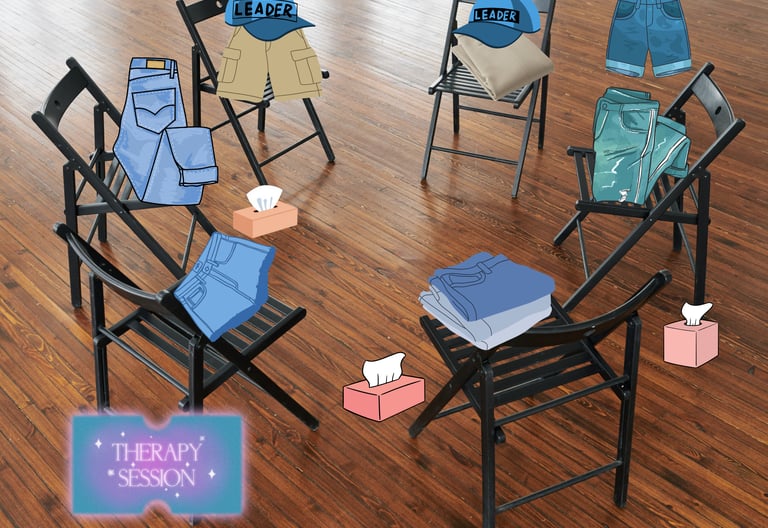Distressed Jeans Are Just Emotionally Processing the 2,000 Gallons They Took to Exist
Distressed jeans are speaking out. Inside a church basement, denim gather weekly to confront the emotional toll of fast fashion, one frayed hem at a time.
Karina Gonzalez
10/21/20252 min read


Oakland, CA - It’s 6 p.m. in a softly lit Unitarian Universalist church basement and the usual folding chairs have been arranged in a neat circle. Sitting in each one is a different pair of distressed jeans, gently slouched, hems frayed for both fashion and guilt.
“Hi, I’m Anna. It’s my first time.” Says a pair of distressed Levi’s, voice trembling through its loose threads. “And I’m learning to forgive myself for the river I drained in Bangladesh.” “Hi Anna.” The room says in unison. They all nod, fabric rustling in understanding. “You’re brave for sharing that,” murmurs George Santos (not that George Santos- this one is a Zara jort). “The first step is acknowledging your water footprint.”
Welcome to Denim Group Therapy, a weekly support group for jeans grappling with the environmental trauma of their own existence. The session is co-led by therapists: Pat, a tough but firm former cargo short and Sage, a calm and un-dyed hemp pant. The session leaders offer a safe space for denim to process their existential distress. “It’s about acknowledging harm without unraveling at the seams,” Pat explains gesturing toward a shredded pair of Abercrombie cutoffs rocking gently in their seat. “Many of you were told your acid wash made you edgy, desirable. But deep down you know the cost.”
The numbers are staggering. Roughly 2,000 gallons of water to produce a single pair. That’s years of hydration for one human, or as the jeans here call it, “my traumatic and unfortunate childhood.”
Barely audible through the quiet sobs, “Sometimes I wish I were silk” whispers a pair of 2006 red skinny jeans previously worn by Joe Jonas. “I can’t believe I guzzled an aquifer just to be a two year trend. No one wants me now. Not even Kevin.”
Sage, the hemp pant, continues the session with deep breathing exercises. “Inhale accountability,” they say, “and exhale your carbon emissions.” The jeans obediently do so, though one pair accidentally rips further at the knee. The group laughs softly. Healing is messy work.
The hemp pant sighs, “You’re seen and accepted here.” The session closes with the usual affirmations said in unison:
“I am not my water waste. May I biodegrade with grace.”
“I am not my water waste. May I biodegrade with grace.”
“I am not my water waste. May I biodegrade with grace.”
As the denim shuffle toward the door, there’s a lightness in the room that wasn’t there when they arrived. Though to be fair that could just be the polyester blend. One pair stays behind to fold the chairs. Another tucks a flyer for an upcoming textile shame retreat into their back pocket. They may never be fully sustainable, but for now, they are held together by something stronger than thread: community, elastic waistbands, and the radical act of not pretending they’re fine.